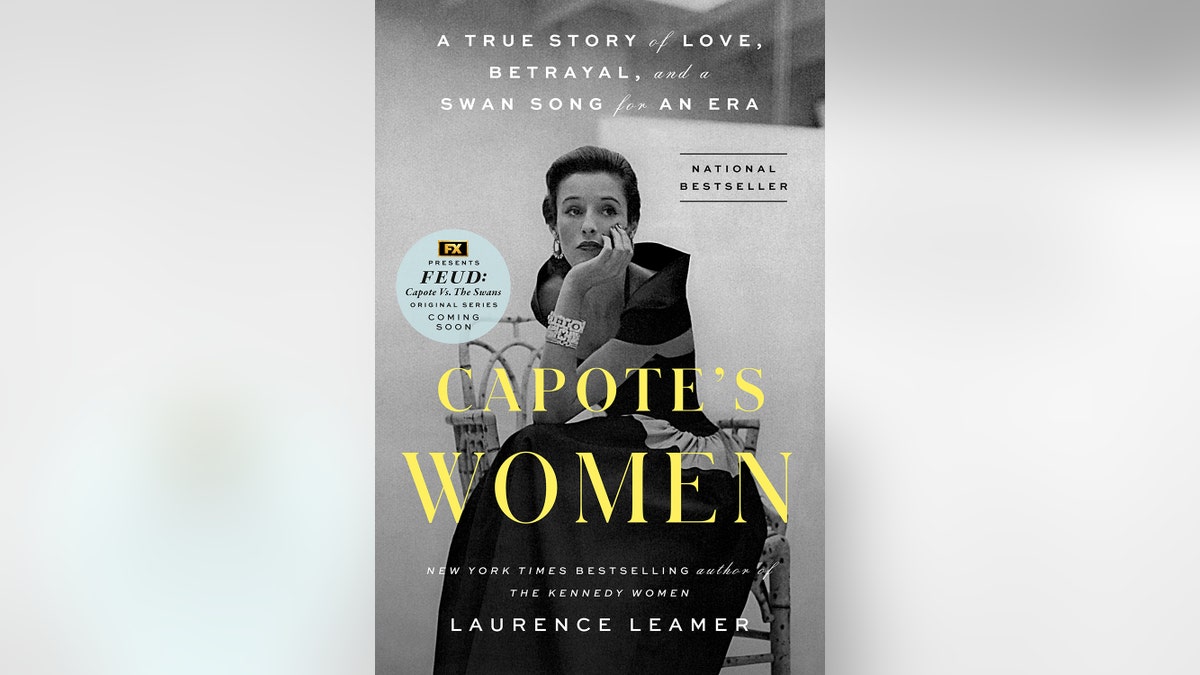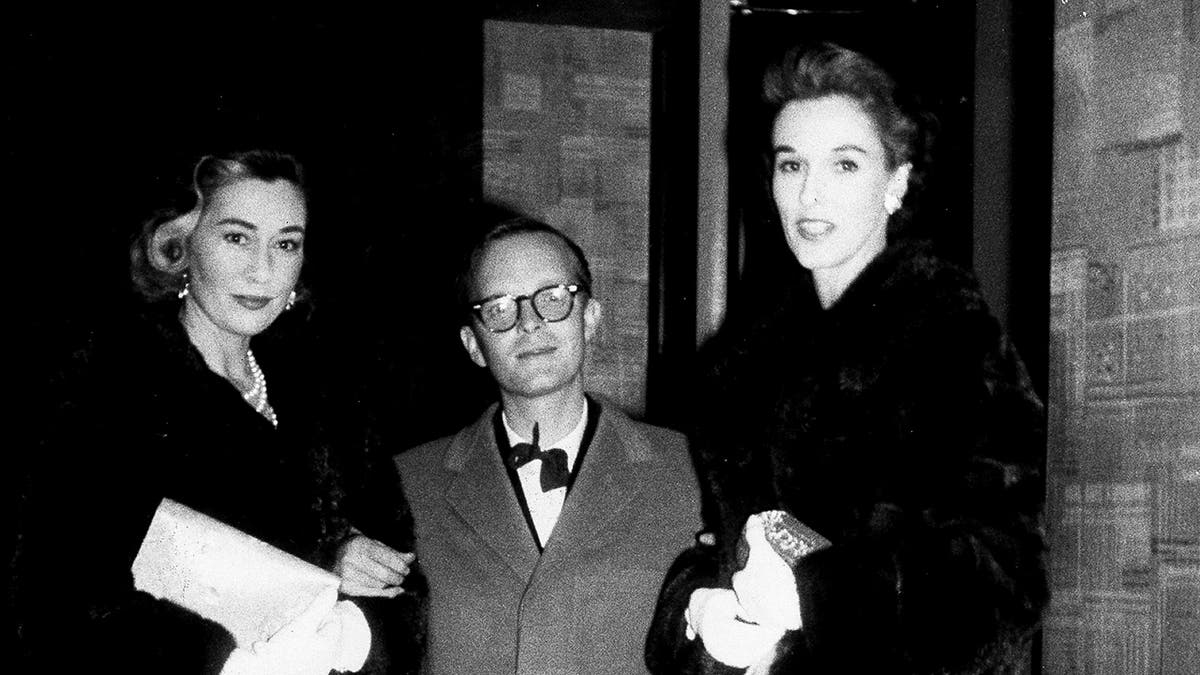This story discusses suicide. If you or someone you know is having thoughts of suicide, please contact the Suicide & Crisis Lifeline at 988 or 1-800-273-TALK (8255).
For nearly 50 years, many have wondered if Ann Woodward got away with murder.
The New York socialite found herself in the crosshairs of Truman Capote following the fatal shooting of her wealthy husband, and she paid with her life. In 1975, the 59-year-old was found dead in her duplex apartment on Fifth Avenue. The mother of two poisoned herself with cyanide.
The shocking true-crime case that rocked Manhattan’s elite is highlighted in the limited series “Feud: Capote Vs. The Swans,” which explores how the secrets of high society made their way into the pages of the author’s works. The series is based on Laurence Leamer’s bestselling book, “Capote’s Women: A True Story of Love, Betrayal, and a Swan Song for an Era.”
New York socialite Ann Woodward, pictured here, is being depicted by Demi Moore in Ryan Murphy’s “Feud: Capote Vs. The Swans.” (Getty Images)
Woodward is portrayed by Demi Moore in the series.
“So many lies have been said about Ann Woodward and that upsets me,” Leamer told Fox News Digital. “Truman Capote wrote a false story that had devastating consequences.”
“Truman Capote wrote a false story that had devastating consequences.”

Laurence Leamer is the author of “Capote’s Women: A True Story of Love, Betrayal, and a Swan Song for an Era.” (Penguin Publishing Group)
Woodward, a Kansas native, was an aspiring actress and model who was voted “The Most Beautiful Girl in Radio” in 1940. After attempting to see her name in lights, her luck changed when she caught the eye of millionaire sportsman William Woodward Jr.

Ann Woodward was an aspiring model and actress when she met William Woodward Jr. (Getty Images)
His father, William Woodward Sr., was the heir to Hanover National Bank and Belair Farm in Maryland. He previously met his future daughter-in-law at New York City nightclub FeFe’s Monte Carlo.
Woodward Sr.’s son and the charismatic dancer tied the knot in 1943.
“She was a radio actress. She did all kinds of things that young women did at the time,” Leamer explained. “She was no worse, no better than a lot of others. She was a beautiful young woman, and he was a young man. He’d been in the military when she met him. And, look, she probably was looking for a rich husband, right? There’s no crime against that. Ultimately, she was a poor young woman who came to New York and married a wealthy man, a common story.”
FOLLOW THE FOX TRUE CRIME TEAM ON X

William Woodward, Jr., who died of gunshot wounds at his Oyster Bay Cove, Long Island, estate, and his wife, Ann Woodward. The picture was taken at the Embassy Club in the Ambassador Hotel in New York. (Getty Images)
But a happily ever after for Woodward wasn’t meant to be. The union was plagued with problems, and Woodward was often shunned by their inner circle. The romance deteriorated and, after two sons, Woodward Jr. asked for a divorce.
“It was a troubled marriage,” said Leamer. “But if, in every troubled marriage, the wife killed her husband, the cemeteries would be full.”
And the union ended with a bang.

William Woodward Jr., owner of the famed Horse Nashua, was found shot to death on a Long Island estate. His wife Ann Woodward said she mistook him for a prowler. She was under sedatives following the shooting. (Getty Images)
On the night of Oct. 30, 1955, the couple had returned to their lavish Oyster Bay mansion after attending a boozy party hosted by the Duke and Duchess of Windsor. News of a local prowler causing havoc in the neighborhood prompted the strained couple to sleep in separate bedrooms with weapons by their side. Woodward was awakened by the incessant barks of her miniature poodle, followed by a strange noise. Fearing the burglar had broken in, she stepped into the darkness and fired.

William Woodward Jr., seen here with his wife and beloved race horse, was 35 years old at the time of his death. (Getty Images)
“She thought the burglar was in the hallway,” Leamer explained. “She came out, she took her shotgun and fired it down the hall, killing her husband. Now the shotgun, it was a bird gun with these tiny pellets. Normally, that wouldn’t have killed her husband. But it just so happened that one of those tiny pellets hit him in the head.”
“There was a burglar probably in the house at that point,” Leamer continued. “She shot her shotgun — a bird rifle — and he died. But it was an accident.”
“She came out, she took her shotgun and fired it down the hall, killing her husband.”
SIGN UP TO GET TRUE CRIME NEWSLETTER

A sketch of the William Woodward Jr. shooting. (Getty Images)
The tabloids — and Woodward’s mother-in-law — showed no mercy. Other wealthy socialites taunted Woodward, labeling her a gold digger and a “bunny girl.” And then the rumors intensified. Some alleged she was a mistress to Woodward Sr. before marrying Jr.
Others insisted Woodward was set up by Sr. to hide Jr.’s alleged homosexuality. Many also believed Woodward couldn’t handle her husband’s alleged infidelities with other showgirls and knew she would lose her fortune — and two sons — in divorce.

Ann Woodward (center) in 1948 at the Chateau L’Horizon, property of Prince Aly Khan, bottom left, who would wed Rita Hayworth (bottom right) the following year. Top left is Bonnie Edwards Manville Babst Wilson Beigel, the wife of movie executive Charles Beigel. (Getty Images)
But Leamer, who reviewed Woodward’s files and other unseen documents from the case, is adamant that the shooting was nothing more than a horrific accident.
“The central misconception is that she murdered her husband,” said Leamer. “She didn’t do it. And it just sickens me to see other books claiming she did. It’s not fair to her, it’s not fair to her heirs, and it’s not fair to the truth. The rumors from the upper class were horrendous and vicious. … There were these low-down journalists who were so eager to earn a quick buck and make up these stories.”

Ann Woodward crying in court. (Getty Images)
But not everyone shunned the seemingly heartbroken widow. Several witnesses who had attended the party on that fatal evening supported Woodward’s testimony regarding her worries about prowlers, The New York Times reported. After deliberating for 30 minutes, a grand jury ruled that “no crime had been committed.”
According to the outlet, Nassau County Police arrested a 23-year-old suspect who pleaded guilty to attempted burglary on the Woodward estate on the night of the shooting. However, Woodward was found guilty in the court of public opinion.

Ann Woodward is seen here in a limousine leaving the hospital. (Fred Morgan/NY Daily News Archive)
According to Leamer, it was Capote who found inspiration from the “vicious and horrendous” gossip being spread about Woodward. Leamer noted that Capote, who surrounded himself with a bevy of “swans,” or New York’s elite, wasn’t fond of the former model whom he called “Mrs. Bang Bang.”
GET REAL TIME UPDATES DIRECTLY ON THE TRUE CRIME HUB

Truman Capote (center) with socialite Jean Murray Vanderbilt (left) and Barbara Babe Paley, circa 1957. (ullstein bild/ullstein bild)
“She had made some nasty gay comments to him,” Leamer alleged. “He was infuriated. That’s when he accused her of murder.”
Capote turned to his typewriter and depicted Woodward as Ann Hopkins, a gold digger who shoots her husband in “La Côte Basque 1965.” Woodward was found dead days before an excerpt was published in Esquire. It is believed Woodward managed to see an advanced copy of Capote’s writing before taking her life.
Leamer alleged Capote “didn’t” feel remorse.

Truman Capote is seen here dancing with Marilyn Monroe at El Morocco, circa 1955. (Getty Images)
“Afterward, he went and tried to get more material for his book,” Leamer claimed. “He almost immediately didn’t even give it a grace period. He was a charming, fascinating, brilliant writer. A creative genius. But there was also a nasty quality that cannot be denied.
“He didn’t have to do this to Ann Woodward. He had the documents. He knew the truth. And she couldn’t sue him for libel because he didn’t use her real name. But everyone knew what it was about. Ann was very distressed and devastated to know this would be out there again, and everybody would read Truman’s words and believe them.

It is believed that Truman Capote called Ann Woodward “Mrs. Bang Bang.” (Getty Images)
“She committed suicide,” Leamer reflected. “But as far as I’m concerned, not legally, but in a virtual sense, Truman murdered her.”
Following Woodward’s death, her mother-in-law allegedly said, “She shot my son, and Truman just murdered her, and so now I suppose we don’t have to worry about that anymore.”

Ann Woodward’s sons, William Woodward III, 11, and James, 7, at the time of the shooting. (Hal Mathewson/NY Daily News Archive via Getty Images)
But the tragedy didn’t end there. Woodward’s sons each jumped to their deaths. Jimmy Woodward died in 1978 at age 31. His older brother, William “Woody” Woodward, died in 1999 at age 54.
Capote, known for “In Cold Blood” and “Breakfast at Tiffany’s,” died in 1984 shortly before his 60th birthday.
Today, Leamer hopes readers will see a new side to Woodward.

Ann Woodward hysterically told police she shot her husband in the darkened hallway between their two bedrooms in the belief that he was a prowler at their Oyster Bay estate. (Getty Images)
“No matter what you do, people may come at you and accuse you of something you didn’t do,” he said. “It’s a tragic thing. People can be so wonderful, but they can also be so disgusting.”